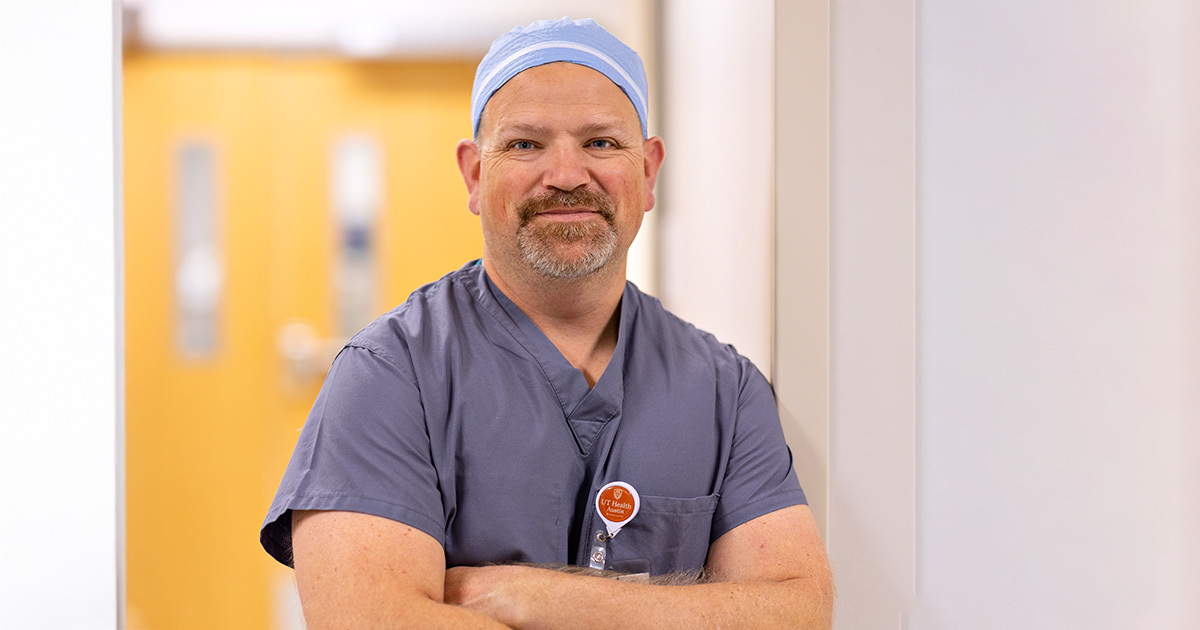Reviewed by: Lorraine Weems and Karl Koenig, MD
Written by: Lauren Schneider

Longtime Austin resident Lorraine Weems, 59, knows that quality patient care is paramount. As an in-home caregiver for local seniors and paratransit driver for individuals with disabilities, she has dedicated her career to the service of others.
However, when her own health needs began interfering with her work, a hip replacement at UT Health Austin’s Musculoskeletal Institute helped Lorraine overcome the hip arthritis that posed a serious interruption to her life.
“Before my hip replacement, I had been working full-time through my hip pain for years,” shares Lorraine. “This surgery allowed me to continue serving my community to the best of my ability.”
Facing a Painful Disruption
In addition to her regular caregiver work, Lorraine began delivering food to individuals in need through Meals on Wheels during the COVID-19. During an August 2020 delivery shift, she was overcome by a sharp pain that radiated through her back.
Lorraine visited the hospital shortly afterward, where she learned she had two herniated discs on the left side of her back. Since she still had to financially support her family, she continued working, despite her back pain.
By fall 2021, Lorraine had also developed severe hip pain, but still could not afford to take time off work. Lorraine’s primary care doctor diagnosed her with hip arthritis and offered her physical therapy and medication; neither were viable as a long-term solution for her pain.
“I felt like my doctor was only treating my symptoms, and not acknowledging my needs as a patient,” recalls Lorraine. “I had to advocate for myself by seeking input from a new primary care physician.”
Learn how UT Health Austin providers empower patients to take charge of their health.
Seeking Patient-Centered Care
At her February 2024 appointment, Lorraine’s new provider informed her that she was eligible for a hip replacement at the Musculoskeletal Institute through the Medical Access Program (MAP), a Central Health initiative that provides essential care for free or reduced cost for qualifying low income and uninsured Travis County residents.
“The relationship between Musculoskeletal Institute and Central Health supports the mission and vision of Dell Medical School as an institution that serves the entire community,” says Karl Koenig, MD, board-certified orthopedic surgeon and Executive Director of the Musculoskeletal Institute.
Lorraine met Dr. Koenig and the rest of her Musculoskeletal Institute care team in April 2024, and they developed an individualized treatment plan based on her unique needs. At each phase of her treatment, the team had Loraine perform a self-assessment of her pain and hip function to better understand how her condition was affecting her life.
“Assessing patient-reported outcome measures helps our team determine the most appropriate care plan,” explains Dr. Koenig. “These measures allow us to incorporate the patient’s perspective on their own condition alongside our clinical observations as health professionals.”
Learn more about Dr. Koenig’s commitment to fostering meaningful connections with patients to provide the highest quality care.
Lorraine’s initial survey responses confirmed the severity of her hip arthritis, and she was scheduled for a hip replacement surgery in May 2024. In the meantime, her pain and function score continued to decline, further reinforcing the necessity of the procedure.
Ensuring Success at Every Stage of Treatment
After her hip replacement, Lorraine returned for follow-up appointments over the next several weeks so that Dr. Koenig and his team could perform x-ray imaging on her hip and guide her through physical therapy exercises to support her healing journey.
“At her six-week post-operative visit, Lorraine’s self-reported pain and function score had improved dramatically. She was doing her exercises and increasing her activity level. Her hard work was already paying off and she made our team proud,” acknowledges Dr. Koenig.
Moving Forward With Confidence
Lorraine’s improved self-assessment reflects the progress in mobility and function made possible by her surgery. After two weeks of recovery from the procedure, she was back on her feet with more mobility than before. Now, she is back to performing her daily tasks pain-free.
“My hip replacement got me back on track,” says Lorraine. “I can walk, and I can continue working to serve my community and support my family.”
Lorraine has returned to her positions as both an in-home caregiver and paratransit driver. She attributes her return to work to her new primary care provider, who listened to her concerns and connected her to the life-changing treatment she received at the Musculoskeletal Institute.
“Surround yourself with a care team that understands your individual circumstances,” advises Lorraine. “Don’t hesitate to be a self-advocate.”
For more information about the Musculoskeletal Institute or to schedule an appointment, call 1-833-UT-CARES
(1-833-882-2737) or visit here.